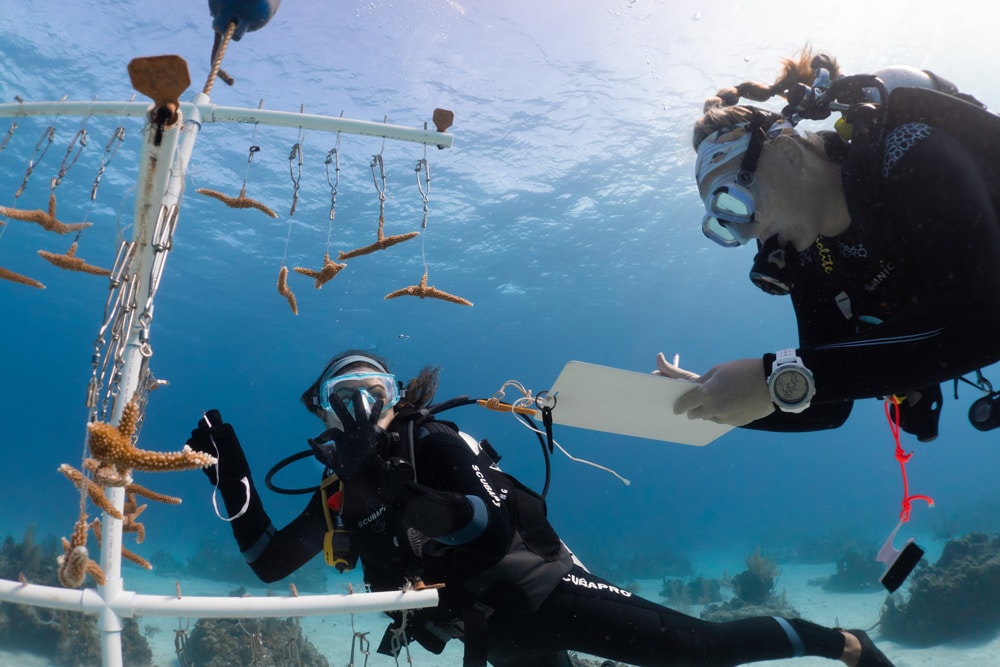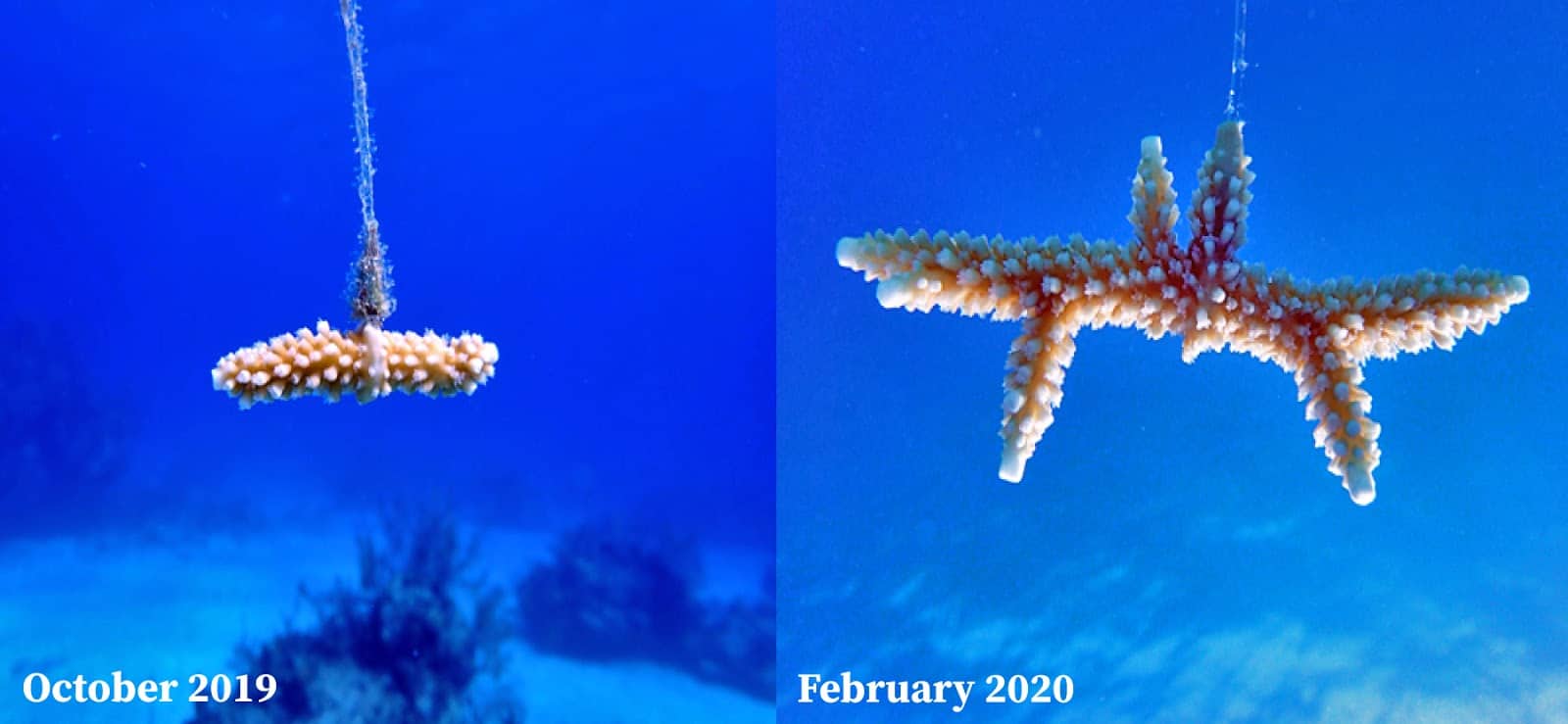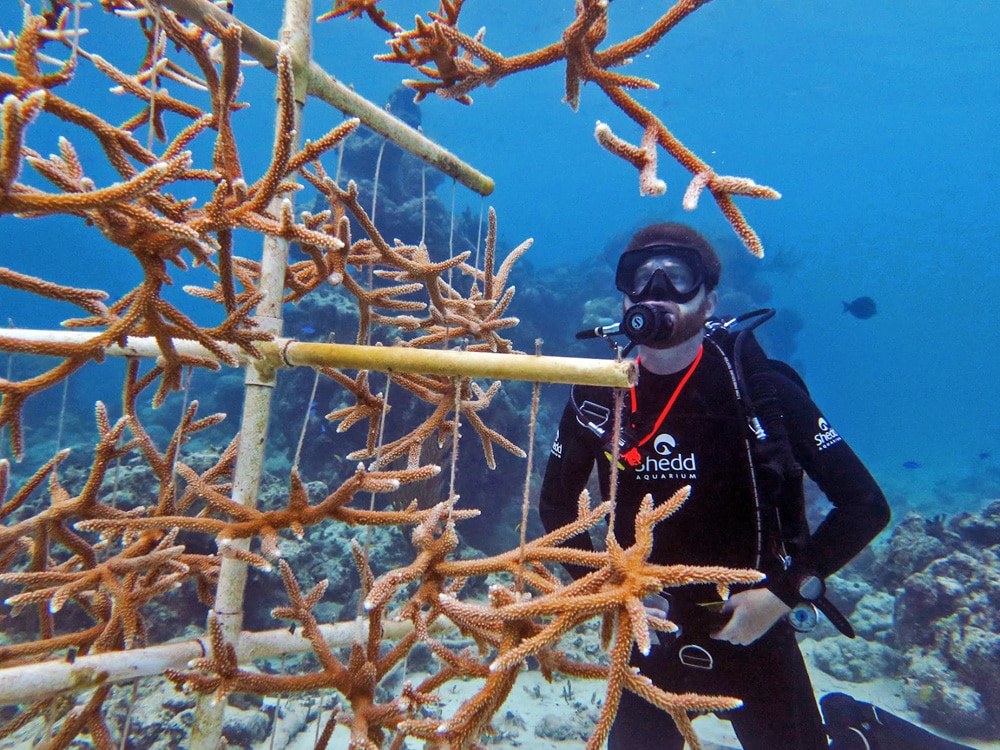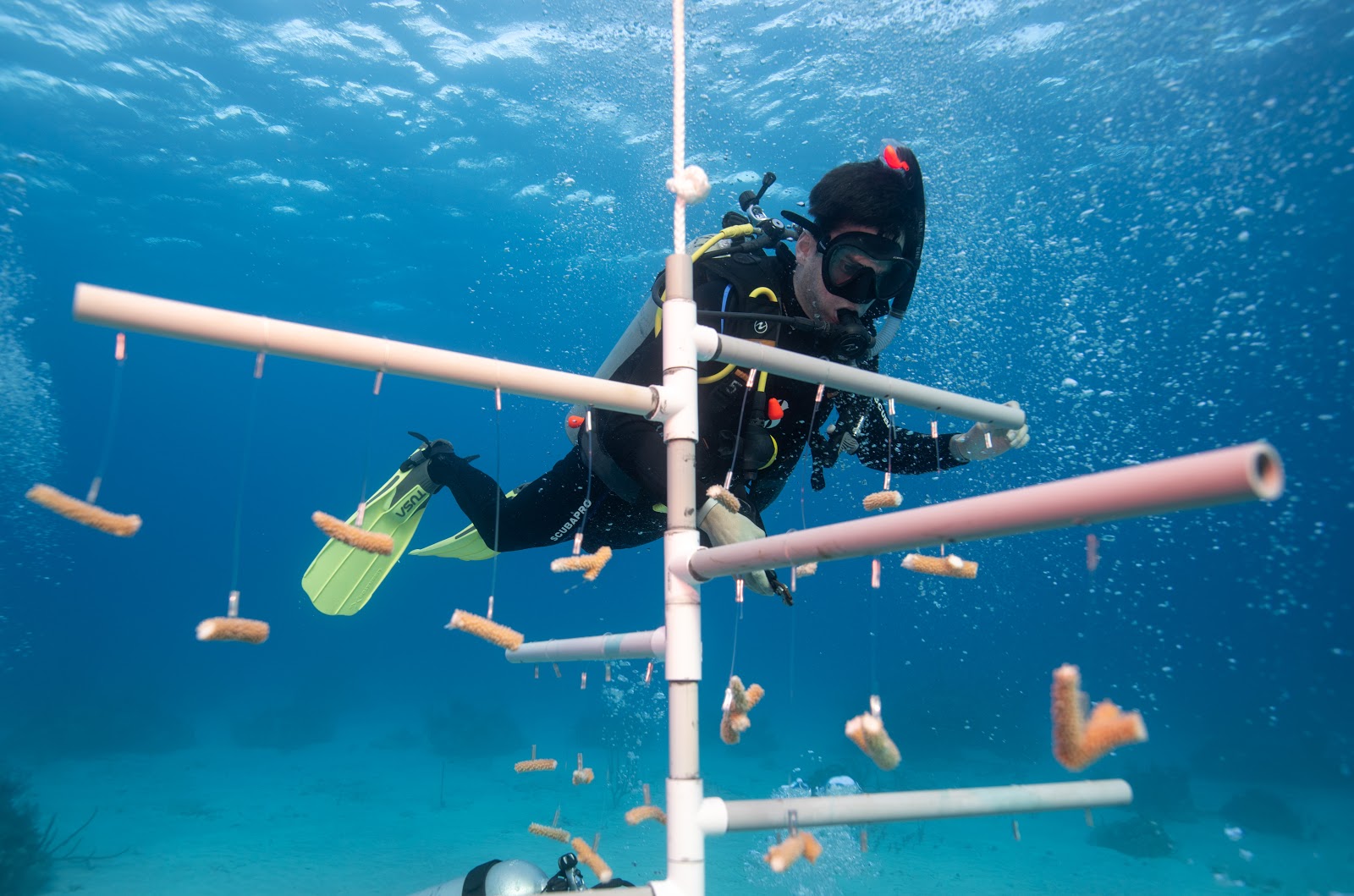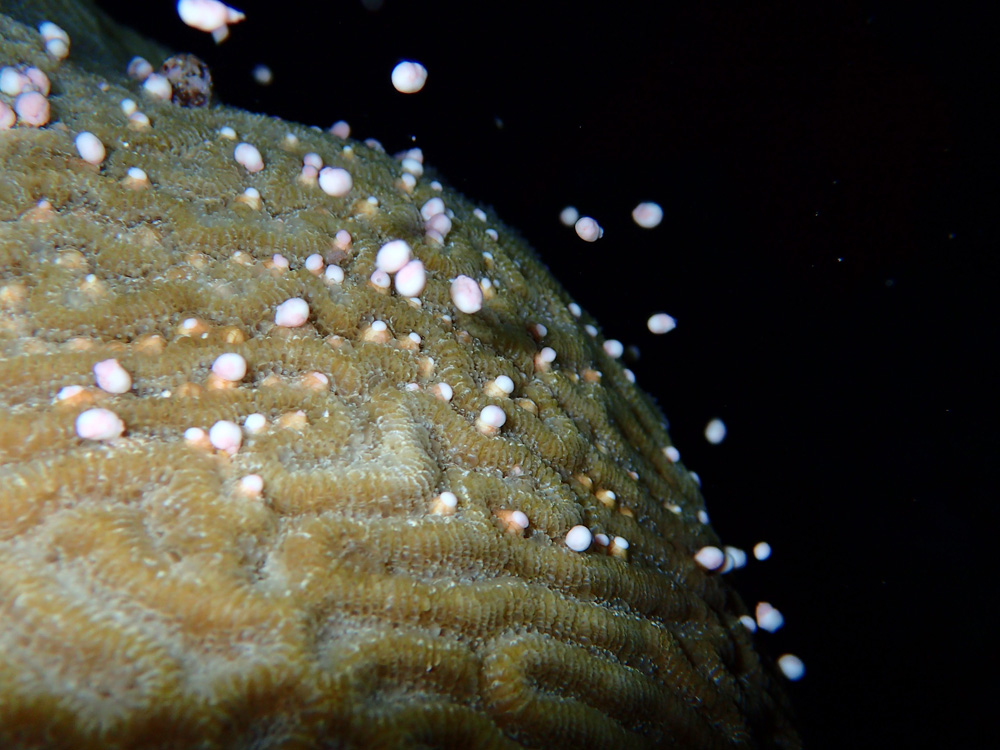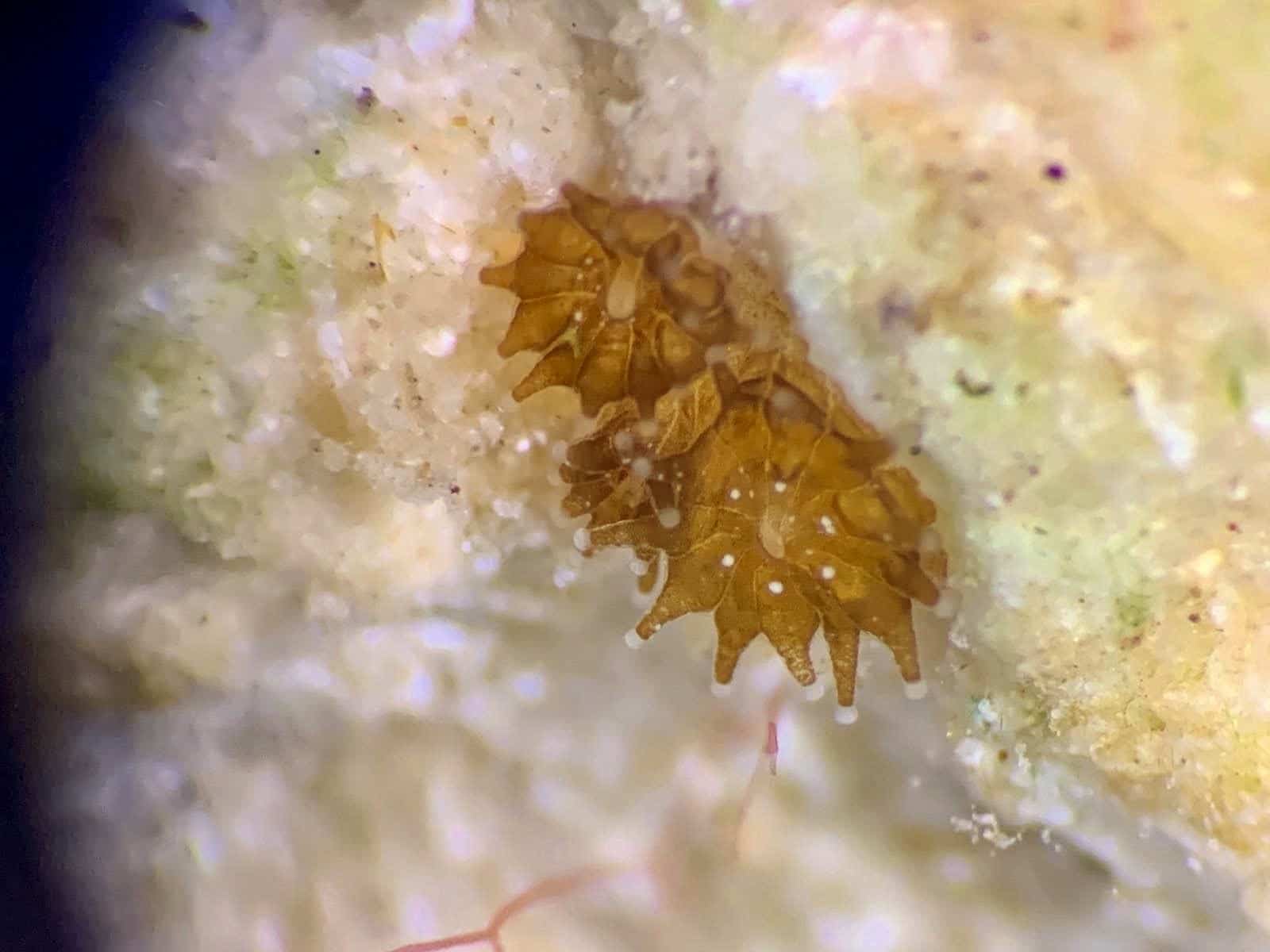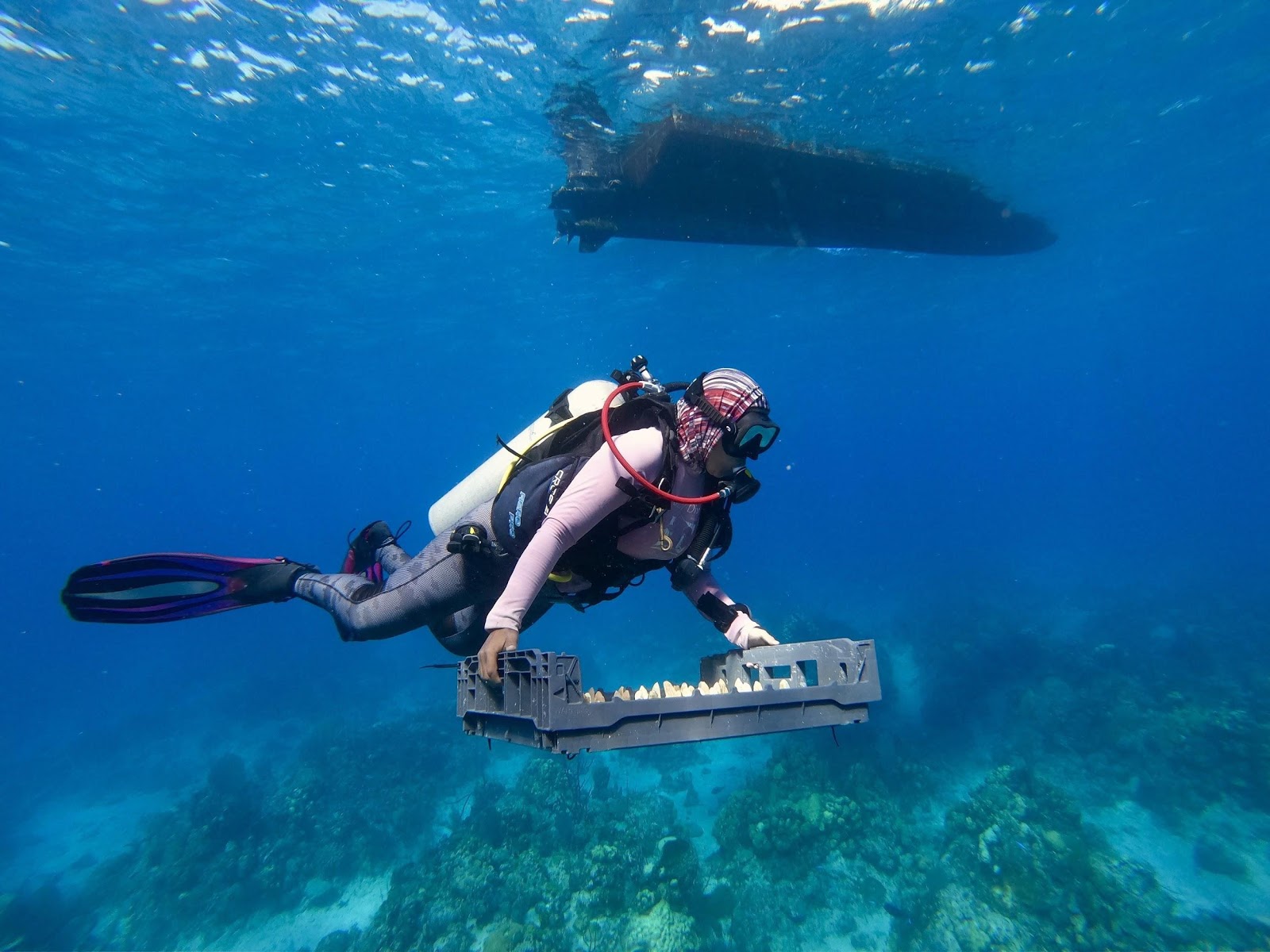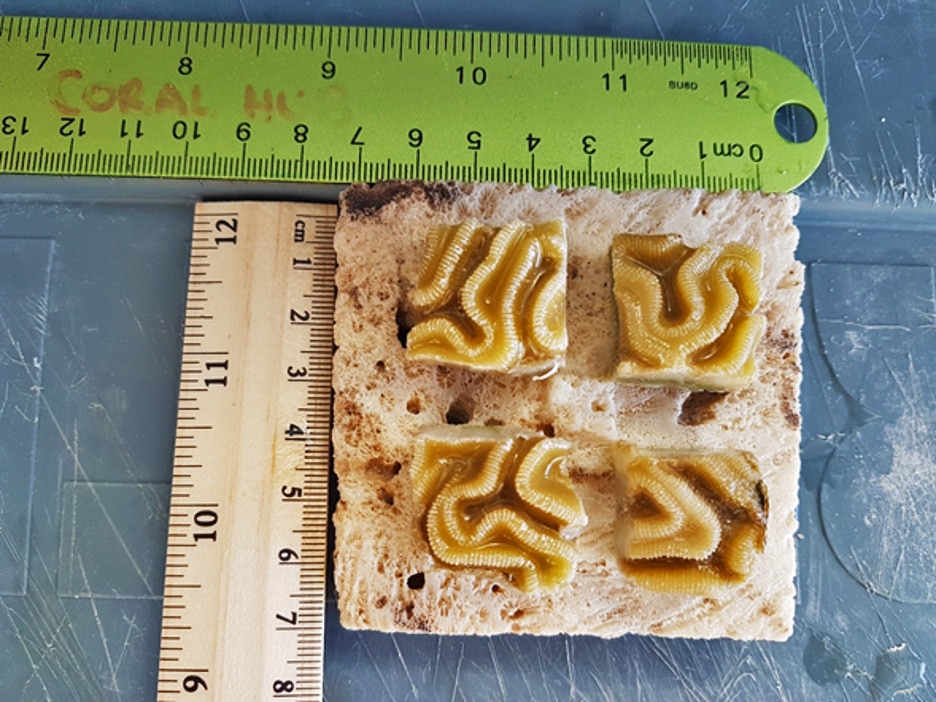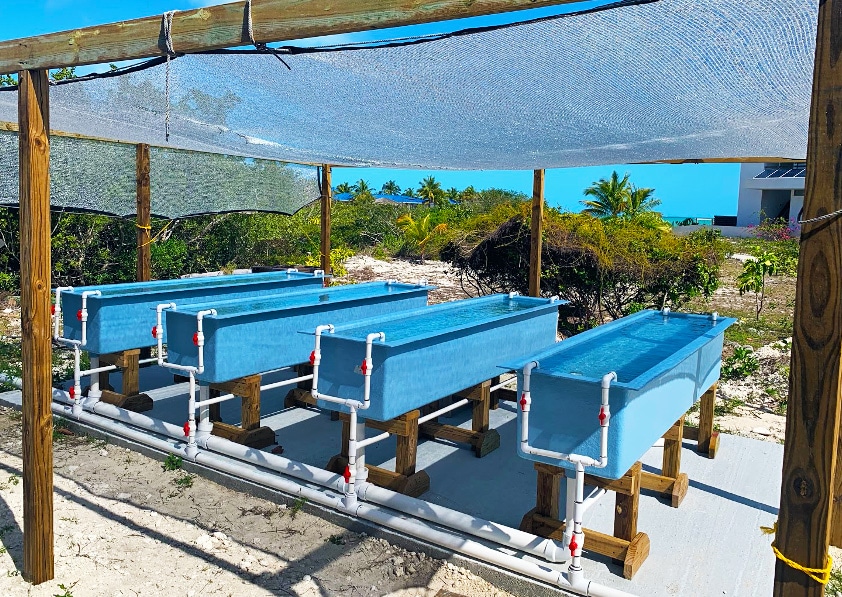Marine Life & Conservation Blogs
Reversing the decline of Bahamian reefs
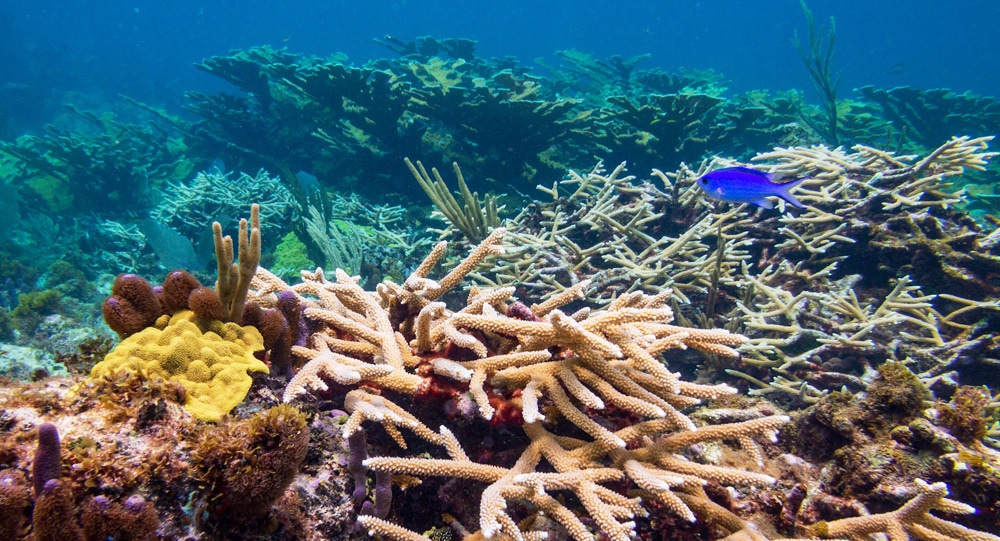
I recently got in touch with the Cape Eleuthera Institute in The Bahamas to ask about their work on coral reef conservation. I was delighted to “meet” Natalia Hurtado, MSc., Coral Reef Research Associate at PIMS/CEI & Casey Harris, MSc., Coral Reef Research Associate at PIMS/CEI. This is what they had to say about their important work.
Much like coral reefs worldwide, coral populations in The Bahamas are declining at alarming rates, making coral restoration more vital to preserve marine resources and local economies. The Bahamas Coral Innovation Hub located in Eleuthera, The Bahamas is a collaboration between the Cape Eleuthera Institute (CEI), Perry Institute for Marine Science (PIMS), and The Nature Conservancy (TNC). With our work, we hope to facilitate the recovery of degraded Bahamian reefs and enhance coral population resilience.
One major problem facing coral reefs worldwide is that coral abundance is decreasing due to both local and global threats, making it difficult for corals to maintain genetic diversity on the reef. At the same time, their ecosystem services are deteriorating, affecting human livelihoods and the diversity of marine species that rely on them. At the Coral Innovation Hub, we focus our restoration efforts on 3 main areas of research: nursery-reared coral fragments, larval propagation, and coral microfragmentation. We are also dedicated to student involvement in our research, with the goal of inspiring younger generations to pursue careers in marine conservation. All projects at the Coral Innovation Hub are led by Natalia and Casey.
Nursery Establishment to Improve Genetic Diversity
Corals can reproduce asexually, in which they undergo a strategic life-history trait called “fragmentation”, where pieces of coral can break off from disturbance and then attach to the substrate to form a whole new colony. We can take advantage of this natural process to grow corals at a much faster rate and plant them back on degraded reefs. We do this by growing corals in a mid-water tree structure, which is made with PVC and tethered to the sea floor, where corals are suspended away from sediment and predators. Below is a picture of Researcher Casey Harris taking notes of coral sizes while an assistant is taking measurements.
The establishment of coral nurseries is an important step to keep coral fragments safe while they grow. Caribbean branching corals grow extremely fast and increase in size about 10-20 cm (4-9 in) per year compared to large boulder species, which only grow about 1-2 cm (<1 in) per year. This is great for restoration efforts because after one year of growing in the nursery, branching corals can be outplanted back on the reef.
We are currently running a project with Dr. Ross Cunning (pictured below) at Shedd aquarium and the Reef Rescue Network, where we are investigating the resilience of staghorn corals by spreading different genotypes across The Bahamas to increase genetic diversity within coral nurseries. We have 19 staghorn genotypes that were collected and moved between existing nurseries and wild populations throughout a few Bahamian Islands in October 2019. Increasing genetic diversity within coral nursery projects is important because some genetically distinct individuals may be better suited to withstand environmental stress than others. Having as many different genotypes as possible is essential to successful restoration outcomes.
During a 15-day expedition onboard the Shedd Aquarium research vessel R/V Coral Reef II, 570 staghorn corals were distributed between newly established nurseries located in Bimini, Nassau, Cat Island, and Eleuthera. In each location, coral growth has been monitored by our partners and they are thriving in their new locations.
Student Involvement as Reef Rescue Divers
The Coral Innovation Hub at CEI works closely with Island School students and visiting educational groups from different ages and backgrounds. These students have a unique opportunity to complete a PADI Reef Rescue Diver Specialty Course. This course was developed by Hayley-Jo Carr, Training Director & Coordinator of the Reef Rescue Network, and Dr. Craig Dahlgren, Executive Director of PIMS. The Reef Rescue Diver Specialty and Reef Rescue Network were both created by PIMS, with the goal of rehabilitating coral reefs by working with various partners to establish a network of coral nurseries around The Bahamas and other parts of the Caribbean.
During the course, students learn about the value of coral reefs and restoration, different types of nurseries, how to maintain nurseries, coral fragmentation, outplanting and monitoring. They work with Critically Endangered species, such as elkhorn and staghorn coral, that were once abundant on Caribbean reefs but have rapidly declined since the 1980s. We target these species for restoration because they play an important ecological role on the reef by providing high rugosity and three-dimensional functionality that protects our shorelines and provides shelter for marine life.
Implementing Larval Propagation as a Restoration Technique
Corals can also reproduce sexually. In sexual reproduction, corals release “spawn” (egg and sperm) and can synchronize their spawning events with colonies of the same species. Pictured below are the gamete bundles of a brain coral, in which the coral releases both egg and sperm (male and female gametes). We can take advantage of these spawning events to collect their spawn and cross fertilize them to increase genetic diversity, and study the vulnerable early life-history stages of corals.
During summer 2019, Coral Innovation Hub researchers collected coral gametes and saw high rates of fertilization and settlement success, with over 5,000 Orbicella faveolata (mountainous star coral) recruits (coral babies pictured below) settled on SECORE Seeding Units (concrete and ceramic substrates).
We are allowing juvenile corals to grow in an offshore nursery tree and outplanted more than 1,000 substrates with coral recruits onto the reef. The goal is to determine if initial and long-term coral survivorship is possible in an offshore nursery and/or on the reef. This research was conducted during SECORE’s International Coral Spawning and Propagation Workshop hosted at CEI with PIMS and TNC. Below is a picture of Researcher Natalia Hurtado carrying substrates to be outplanted on the reef.
A New Restoration Technique for Boulder Corals
Another way to grow corals through asexual reproduction is by using a new restoration technique for slow-growing boulder species called “microfragmentation,” founded by Dr. David Vaughan, Plant a Million Corals. This process consists of cutting fragments of the same colony into small pieces (1-3 cm, pictured below), using a specialized saw. The clone fragments will recognize each other and fuse together, growing 25-50 times faster than normal.
At the Coral Innovation Hub, we plan to run pilot experiments on different coral species to document the most successful microfragmentation methods needed to upscale our efforts. As part of our study, we will examine the survivorship and growth of microfragmented boulder corals (brain corals, star corals, etc.) in our land-based wetlab facility (pictured below). If proven successful, we will grow boulder corals in an offshore table nursery or directly outplant microfragments to the reef.
Want to know more about Reef Rescue Network? Please contact Hayley-Jo Carr. If you have any questions or want to get involved with The Bahamas Coral Innovation Hub project, please contact Natalia Hurtado or Casey Harris.
Blogs
Saba’s Plan for a Coral Comeback

Saba has an exciting new initiative to restore its coral reefs. This new project, running from 2024 to 2026, will focus on reviving key species in the island’s underwater ecosystems. With a collaborative team from the Saba Conservation Foundation (SCF) and Van Hall Larenstein (VHL) University of Applied Sciences, the project aims to restore both corals as well as sea urchins.
This initiative is centered around coral restoration, specifically reviving two essential coral species—staghorn coral (Acropora cervicornis) and elkhorn coral (Acropora palmata). By mapping parent colonies and using a technique known as coral gardening, SCF will create and maintain coral nurseries. These corals will eventually be outplanted at key reef sites around Saba to not only expand the number of coral colonies, but also provide essential fish habitat. The project focusses on installing coral nurseries, training staff with the newest techniques and starting with the restoration of key reef sites.

Reef Cleaners to the Rescue
It’s not just corals getting a makeover—this project also shines a spotlight on the essential role of grazers, particularly sea urchins. VHL is leading the charge on cultivating and restocking two key sea urchin species, West Indian sea egg (Tripneustes) and long-spined sea urchin (Diadema), known for their ability to keep algae in check. By removing algae, which are important competitors of corals, they help the coral to thrive. By restoring these “reef cleaners,” Saba’s project will give corals the breathing room they need to grow, setting the stage for a healthier, more balanced marine ecosystem.
From Tiny Urchins to Big Goals
The project will be funded as part of the Dutch Government’s Nature and Environment Policy Plan (NEPP) 2020-2030 for the Caribbean Netherlands, a comprehensive initiative aimed at conserving and restoring the unique natural environments of the Dutch Caribbean islands, including Saba, St. Eustatius, and Bonaire. This project is aiming for big milestones: build and maintaining coral nurseries, the expansion of urchin cultivation facilities, and the creation of a dedicated research center. By 2026, the project hopes to ramp up coral and grazer restoration, with the ultimate goal of extending these efforts across the Dutch Caribbean. By linking local initiatives to broader regional goals, Saba’s restoration project promises to leave a lasting impact on both the environment and the community.
Find out more about the DCNA at dcnanature.org.
Blogs
Reef-World marks two decades of marine conservation: strengthening impact amid coral reef threats

Empowering ocean stakeholders to tackle future challenges and ensure the survival of coral reefs and humanity
2024 marks the 20th Anniversary of The Reef-World Foundation’s tireless efforts for global coral reef conservation. The UK charity is the international coordinator of the UN Environment Programme’s Green Fins initiative, known as the leading voice in sustainable marine tourism. Today, Reef-World released its 2023-2024 Impact Report outlining a year of substantive growth and impact in its marine conservation programmes.

Impact Report Highlights:
- Impressive improvements in environmental behaviours to protect coral reefs by the marine tourism industry as the global participation of Green Fins increases.
- Continued capacity building for government and NGO staff to effectively manage marine tourism activities in Asia, Caribbean and Red Sea regions.
- For the first time in Green Fins’ 20-year history, tourism operators have achieved ‘Best Environmental Performer’ status by demonstrating the lowest possible environmental impact in their environmental assessments. In 2024, three dive operators achieved this challenging milestone.
- Significant increases in global participation of Reef-World’s innovative digital conservation tools.
- 138 Green Fins dive operator members achieved the strict threshold for PADI Eco Center recognition.
- Developed four new educational materials and translated two into 16 languages to support the marine tourism industry in achieving sustainability targets.
- Establishing a new Reef-World Development strategy and recruiting new roles – Development and Programmes Managers.
- Reef-World’s board welcomes new Chair and Trustees strengthening organisational leadership.

Reef-World started as a one-person mission to inspire and empower communities to act in conserving and sustainably developing coral reefs and related ecosystems. Today, the team of 12 continues to meet this mission by inspiring and empowering the global marine tourism community to be exemplary sustainability leaders by using the Green Fins guidelines and tools to simultaneously use and protect the world’s precious reefs.
In April 2024, the fourth global coral reef bleaching event was confirmed. Reef-World’s work has never been more urgent as the marine environment, and the benefits they provide humanity, continue to be eroded by global threats. The reduction of local threats, like those from the marine tourism industry, is an essential step to ensuring a future where coral reefs survive and continue to support the millions of people who depend on their ecosystem benefits. Reef-World’s work buys time for coral reefs and related ecosystems to be resilient to the impacts of global threats.
“Right now our corals are facing the greatest fight of their existence as the terrifying predictions of the steps towards their complete extinction are starting to come true. But all is not lost, reefs are resilient and they have existed on this planet for millions of years. We must take action now, to buy time for reefs by reducing threats facing them and allowing them to react and adjust to the changing environment they need to survive in.” – Chloe Harvey, Executive Director
Looking Forwards:
Like coral reefs, the Reef-World team needs to be resilient in the face of the complex challenges of the conservation sector. Reef-World has invested significantly in developing a Culture of Care to ensure the well-being of its team on a daily basis, continuing to be an exemplary employer to enable its team to best achieve the mission for coral reef conservation.
With the foundations of a Culture of Care and organisational development laid, Reef-World is emerging from the end of a natural organisation life cycle, that brings the challenges of growth and scale, stronger than ever. With a new strategy in place to generate much needed resources, Reef-World is excited for the opportunities to leap forward, continue to scale our impact and lean into new innovations and untapped opportunities for marine conservation.
We continually strive to become a forward-thinking organisation that delivers on our goals and commitments to our stakeholders with fresh approaches and not being afraid of steering away from a “normal approach.” This approach is not only applied to our programmes of work but also internally and carries over to our Culture of Care for our team.” — JJ Harvey, Operations Director

The Reef-World Foundation is immensely grateful for the continued support of its grant funders: UN Environment Programme, IUCN’s Blue Natural Capital Financing Facility, Adventure Travel Conservation Fund, PADI Aware Foundation, and World Nomads Footprints Program.
Reef-World would also like to express its gratitude to international partners whose vital support has resulted in significant tangible benefits for our work and mission: PADI; Professional SCUBA Schools International (PSS); Explorer Ventures; 1% for the Planet; ZuBlu; Snorkel Venture, GSTC; Dive O’Clock; Seven Dragons; DiveAssure and Eco Beach, without whom these achievements would not be possible.
The full 2023–2024 Annual Impact Report is available on Reef-World’s website.
-

 News2 months ago
News2 months agoIconic SS United States to become the World’s Largest Artificial Reef
-

 News3 months ago
News3 months agoBook Review – 52 Assignments: Underwater Photography
-

 Gear News3 months ago
Gear News3 months agoDYNAMICNORD – New German diving brand enters the British market
-

 News3 months ago
News3 months agoExploring Cenote El Pit: A Diver’s Dream
-

 Gear News3 months ago
Gear News3 months agoTry BARE drysuits (and maybe even win one!) this Friday with Sea & Sea at North West Dive Fest
-

 Marine Life & Conservation3 months ago
Marine Life & Conservation3 months agoBook Review: Coral Triangle Cameos
-

 Blogs2 months ago
Blogs2 months agoDive the Egyptian Red Sea this Autumn with Regaldive
-

 News3 months ago
News3 months ago2024 Ocean Art Underwater Photo Competition Announced


